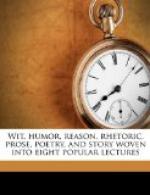“Now let the way appear
Steps unto Heaven;
All that Thou sendest me,
In mercy given;
Angels to beckon me,
Nearer, my God to thee;
Near to Thee.”
May we not hope those brave musicians and those who died that others might live, “On joyful wings cleaving the sky,” ocean and icebergs forgot did upward fly, and on their flight to the spirit world continued the song, “Nearer, my God, to Thee.”
Manhood is not dying out of the world.
Students of history are asking, “Will the fate of Rome be repeated in the history of this republic?” The answer is, we have saving influences in this republic Rome never knew. Rome never had an asylum for her blind or insane; she never had a home for widows and orphans; her “golden house” of Nero never had an equal, but nowhere in her dusty highways could be found footprints of mercy. In Rome the soldier was the cohesive power, while socially everything was isolated. In this republic there is an interlacing and binding together in bonds of human brotherhood. A Methodist here bound to Methodists everywhere, Presbyterian to Presbyterian, Baptist to Baptist, Disciple to Disciple, Lutheran to Lutheran, Catholic to Catholic, Masons, Odd Fellows, Knights of Pythias, Red Men, Maccabees, Woodmen, Christian Endeavor Societies, Epworth Leagues, Y.M.C.A.’s, W.C.T.U.’s, and many other fraternities, making up an interdependent, together-woven, God-allied and God-saving influence ancient empires never dreamt of. These are the moral lightning rods that avert from this republic the wrath of God.
Am I putting too much stress upon the humanity side of national life? Do you tell me money is the great question of this country, tariff the great question? Bring me the Bible and what do I find? Only a very few pages given to the creation of the material universe, with all its gold and silver, suns and systems, but I find page after page, chapter after chapter, and book after book, given to the healing of the lame, the halt and the blind, teaching a kindred spirit of sympathy to meet the common woes of humanity.
What I am about to say may seem more like sermon than lecture, but I believe it will be the best thing I have said when the lecture closes. In the formula of human touch, laid down in the life of Jesus of Nazareth, there is more saving influence for national endurance than in all the wealth of our country’s treasury.
From the time His beautiful mother wrapped Him in coarse linen, and cradled Him on cattle straw in that Bethlehem barn, on up to His death on the cross, He was ever touching the masses, healing their diseases, soothing their sorrows and teaching the lesson, “the more humanity you place at the bottom the better citizenship you will have at the top.” In the golden rule of this human touch lies the hope of this home of the free.
A little boy boarded a car in New York City. A few feet from him sat a finely-dressed lady and as the boy stared at her, he moved nearer and nearer until he was close beside her.




